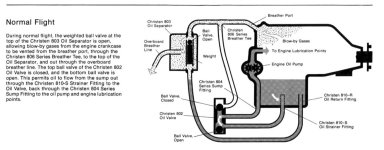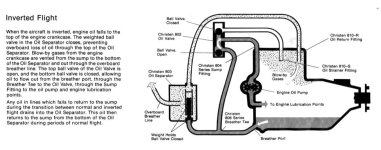Van's Air Force
You are using an out of date browser. It may not display this or other websites correctly.
You should upgrade or use an alternative browser.
You should upgrade or use an alternative browser.
Air/oil separators - good, bad, and the ugly...
- Thread starter Cptnmat
- Start date
scsmith
Well Known Member
Serious popcorn shortage looming
The funniest thing is I just sat down to catch up on this thread, and since I just came in from the shop, and it is snowing out, I made a big batch of popcorn before I sat down!
gmcjetpilot
Well Known Member
That is a rethorical question. Is there any evidence it's doing good? If yes what and how much good. That is the debate.So, I may have missed the bottom line here...is there any evidence that an air/oil separator causes any demonstrated harm to an airplane engine?
It's highly unlikely A/O Separator gets more stuff out than a straight vent pipe. If you drain the condensate back to engine.is that bad? Is it good? Is it necessary?
Harm? Define harm? Worst case A/O seperator or not is blocked vent and you blow main crank seal. Oil will cover your windscreen, followed by loss of oil pressure and engine stoppage. Point is the crank vent system is not trivial and some care and attention is needed.
For people that don't know only fill oil to 6 qts or 5.5 is fine for short flights. Just because 8 qts is max don't fill to max. If you're filling it up to 8 qt it'll blow the first 2 qt out. So by keeping your oil right about 6 you'll reduce oil usage and oil on your belly.
Last edited:
Do they work? Will they harm you engine? Is it just hype? Do they really reduce oil on the belly?
After reading the back and forth of this thread, here is my experience and you can draw your own conclusions.
Here is what I learned when I put an Airwolf separator on my Bonanaza years ago. Note the separator returns the oil to the engine.
Was the belly cleaner? No to maybe. I routinely clean it and can’t tell a difference. What makes a difference is not keeping more than 10 quarts even though full is 12. If you read the manual, you can run ridiculously low oil level and still be safe. It will blow out the first 2 quarts quickly, EVEN WITH THE SEPERATOR. I keep mine between 9 and 9.5 quarts.
Will returning the oil harm your engine? I replaced my engine last year. I can hear the “I told you so”. Keep in mind it was about 700 hours PAST TBO. Compressions all in the 70’s. I changed the oil every 25-30 hours in the last years of its life. Oil analyzes were excellent. No additives, Phillips XC, and used 1 quart between oil changes. The accessories were wearing out and due to high engine time and the request of my wife, it was replaced. Another reason is resale. Once I finish the RV, easier to sell with fresh engine and prop.
What will harm your engine is not flying the plane routinely. I use Flyguard which means it flies weekly for at least 20-30 minutes. Get the engine hot. You will also keep your skills in better condition.
I really can’t tell any difference before and after installing. Only way to have less belly oil was to keep less oil in the engine.
I can’t say it harmed the engine by returning the oil based off the condition of my engine at replacement time.
What I can say it it does separate you from your wallet. Too much dime for not enough sugar.
After reading the back and forth of this thread, here is my experience and you can draw your own conclusions.
Here is what I learned when I put an Airwolf separator on my Bonanaza years ago. Note the separator returns the oil to the engine.
Was the belly cleaner? No to maybe. I routinely clean it and can’t tell a difference. What makes a difference is not keeping more than 10 quarts even though full is 12. If you read the manual, you can run ridiculously low oil level and still be safe. It will blow out the first 2 quarts quickly, EVEN WITH THE SEPERATOR. I keep mine between 9 and 9.5 quarts.
Will returning the oil harm your engine? I replaced my engine last year. I can hear the “I told you so”. Keep in mind it was about 700 hours PAST TBO. Compressions all in the 70’s. I changed the oil every 25-30 hours in the last years of its life. Oil analyzes were excellent. No additives, Phillips XC, and used 1 quart between oil changes. The accessories were wearing out and due to high engine time and the request of my wife, it was replaced. Another reason is resale. Once I finish the RV, easier to sell with fresh engine and prop.
What will harm your engine is not flying the plane routinely. I use Flyguard which means it flies weekly for at least 20-30 minutes. Get the engine hot. You will also keep your skills in better condition.
I really can’t tell any difference before and after installing. Only way to have less belly oil was to keep less oil in the engine.
I can’t say it harmed the engine by returning the oil based off the condition of my engine at replacement time.
What I can say it it does separate you from your wallet. Too much dime for not enough sugar.
Last edited:
MacCool
Well Known Member
That is a rethorical question. Is there any evidence it's doing good? If yes what and how much good. That is the debate.
Yes, it was rhetorical. Since I already have one (not by my choice) I'm much more interested in whether on not it causes harm. In the absence of direct evidence or examples of engine damage caused by the device, I plan to leave it.
Yes, it was rhetorical. Since I already have one (not by my choice) I'm much more interested in whether on not it causes harm. In the absence of direct evidence or examples of engine damage caused by the device, I plan to leave it.
My opinion which is the lowest form of fact is it didn’t cause harm. Perhaps frequent oil changes, regular use, and how the engine was operated may have negated harm.
Sometimes issues turn into something akin to a college football game, when the reality is more nuanced.
This isn't a question of separator vs no separator. No one needs to lubricate the belly skin. The issue is crankcase return vs none.
It is entirely possible to create a harmful separator installation, i.e. one which returns liquid water to the crankcase. Simply cool the system, condensing water and fuel vapor to liquid. The separator will capture liquids, as intended. It doesn't care what kind of liquid.
It's also quite possible to install a system which maintains gas temperature above the dew point of water and fuel. The only liquid will be oil.
Inability to maintain separator temperature above dew point does not mean a separator is ill advised. However, it does preclude a sump return.
This isn't a question of separator vs no separator. No one needs to lubricate the belly skin. The issue is crankcase return vs none.
It is entirely possible to create a harmful separator installation, i.e. one which returns liquid water to the crankcase. Simply cool the system, condensing water and fuel vapor to liquid. The separator will capture liquids, as intended. It doesn't care what kind of liquid.
It's also quite possible to install a system which maintains gas temperature above the dew point of water and fuel. The only liquid will be oil.
Inability to maintain separator temperature above dew point does not mean a separator is ill advised. However, it does preclude a sump return.
I had the Antisplat system when I purchased my airplane. My oil gets black in just a few hours, which was concerning.
Most of my familiarity with these systems comes from my experience building road race cars, where we vent the crank back to the oil tank, and the tank is vented to a separator/condenser and catch can which is built almost identical to what's inside the anti-splat system.
I was always leery of the AS system because we get nothing but garbage out of the race car catch can, usually a milky white fluid and lots of water.
I decided to do a very simple and un-scientific test - I flew the plane, pulled into my hangar, and immediately pulled the separator return line. As I suspected, it was full of the same chocolate milk we get out of the cars, and that was being returned to the sump.
I pulled the system and went to a standard vent dumping on the exhaust pipe. Is my belly any dirtier? Maybe slightly, it's really hard to quantify, but my oil is for sure not getting dirty as quickly.
Yes I cleaned the can regularly, and blew out the lines, and cleaned the line going to the exhaust. Just my personal experience.
Most of my familiarity with these systems comes from my experience building road race cars, where we vent the crank back to the oil tank, and the tank is vented to a separator/condenser and catch can which is built almost identical to what's inside the anti-splat system.
I was always leery of the AS system because we get nothing but garbage out of the race car catch can, usually a milky white fluid and lots of water.
I decided to do a very simple and un-scientific test - I flew the plane, pulled into my hangar, and immediately pulled the separator return line. As I suspected, it was full of the same chocolate milk we get out of the cars, and that was being returned to the sump.
I pulled the system and went to a standard vent dumping on the exhaust pipe. Is my belly any dirtier? Maybe slightly, it's really hard to quantify, but my oil is for sure not getting dirty as quickly.
Yes I cleaned the can regularly, and blew out the lines, and cleaned the line going to the exhaust. Just my personal experience.
Sometimes issues turn into something akin to a college football game, when the reality is more nuanced.
This isn't a question of separator vs no separator. No one needs to lubricate the belly skin. The issue is crankcase return vs none.
It is entirely possible to create a harmful separator installation, i.e. one which returns liquid water to the crankcase. Simply cool the system, condensing water and fuel vapor to liquid. The separator will capture liquids, as intended. It doesn't care what kind of liquid.
It's also quite possible to install a system which maintains gas temperature above the dew point of water and fuel. The only liquid will be oil.
Inability to maintain separator temperature above dew point does not mean a separator is ill advised. However, it does preclude a sump return.
I keep 8-9 Qts in the IO-540, change oil every 50 Hrs, little wipe of belly when changing oil. Film is barely noticeable if you wipe at oil change. Oil temps are fine with 8-9 Qts (12 max). No separator needed.






